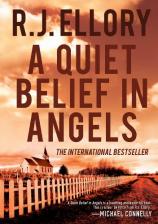Reading Group Guide
Discussion Questions
A Quiet Belief in Angels

1. The novel speaks frequently about how the perpetrator of these acts would have to be subhuman, completely different, to be able to do such horrible things. The sheriff Vallelly wonders if there’s “a percentage of the population that we’ll never understand” (335). What are your thoughts on the capacity for humans to commit evil like this? Are these urges natural, to be controlled, or are those who feel them the only ones who do so, and if so, are they to be pitied as victims of some kind of insanity, unable to help themselves?
2. How does Dearing complicate or reinforce your interpretation of evil? Do you believe it possible for a man to appear as normal as he did and at the same time be responsible for the acts he committed? Where do you think the author would stand on this question?
3. The police have no idea who the murderer is, and a jury wrongly sentences Joseph. And in the end, it is a lonely writer who catches the villain. Do you think Joseph was right not to trust the police, and to insist on doing the job himself? What, in your opinion, is the novel’s attitude on the power and efficiency of law enforcement? Do you want to speculate on how the author’s own experience with the law might influence this?
4. Writing is a very frequent topic in the novel. In the first pages, Joseph talks about feeling like Holden Caulfield, Salinger’s catcher in the rye, and repeatedly during his development mentions those books he is most strongly affected by. But writing has a much clearer effect later in the novel, when Joseph’s book incites a public outcry for his appeal and eventually produces his freedom. What do you feel the purpose and power of writing is?
5. Joseph struggles considerably with his sense of responsibility over the death of the girls, especially Elena. Do you feel he should have felt responsible? Why do we sometimes feel responsible even when there was no opportunity for us to have helped? The other members of the Guardians are able to leave their schoolboy promises and move on with their lives. Why do you think Joseph in particular felt the way he did, and, being the one to catch the killer in the end, should he have?
6. The story splits between chapters of narration and sections of reflection. How did this influence your reading of the novel?
7. How does New York, and Joseph’s life there, contrast with Georgia? How does it mirror your own ideas about the desire to escape one’s troubles, and the need to return to them? Was Joseph right to leave? Should he have gone back?
8. What do you make of the character of Joseph’s mother? Do you believe, as Joseph did for part of the novel, that guilt can cause such a transformation? Do you respect Joseph’s decision to distance himself as much as he could from her? Do you sympathize with the way he separated his mother from the “woman who died?”
9. Throughout the novel, public opinion seems an ignorant yet powerful beast. Did you believe that groups of people could think and act as cruelly as they were portrayed? Do you believe there is a way to fight public prejudice or hearsay, or is it best to bend to it and try to fit in, as Joseph does when he cuts his hair and beard?
10. What did you make of Joseph’s belief in angels? His mother also talks about being able to interact with, even speak with, the dead. How are their situations different? Is it only a matter of degree, or are they fundamentally different in some way? How does being in touch with the dead affect these two characters?
11. What did you feel about Joseph’s first romance? Did you think it appropriate and believable that a schoolteacher would engage with her former student?
12. The defense of Joseph’s mother’s infidelity was that in times of hardship and death, people fight it by bringing about life. Similarly, what did you think of Alex’s comment that their creating a child would make up for the murder of Elena? Do you agree that this is true?








